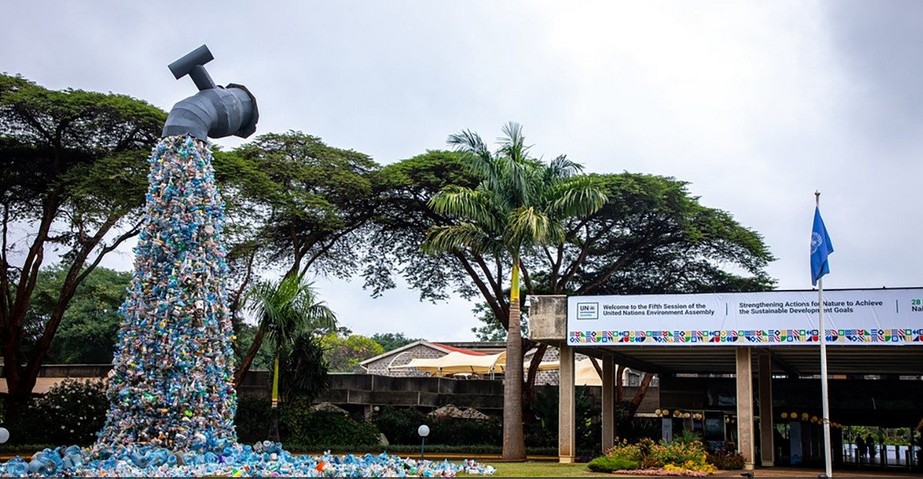A United Nations committee is meeting in Paris on Monday to work on a global treaty to combat plastic pollution as pressure mounts to curb production of fossil fuel-based plastics.
By Zeus Legaspi
The Intergovernmental Negotiating Committee for Plastics is meeting in Paris on Monday to resume the development of the first international, legally-binding treaty on plastic pollution.
The meeting will be held from May 29th to June 2nd and is the second of five meetings that are set to be completed by the end of 2024.
Last year, some 175 nations pledged to agree on a binding deal by 2024 to end pollution from fossil-fuel-based plastics.
However, experts say that the timeline for treaty negotiations is short. This week’s meeting should, therefore, result in the drafting of an initial treaty which will then be negotiated at the third meeting.
"If there’s no text to negotiate, you’re just continuing to share ideas. Then, because of the timeline, we could be looking at an early failure," warned Björn Beeler, the international coordinator for the International Pollutants Elimination Network.
The committee is expected to discuss the first outline of actions that could form the basis of a draft negotiating text. Proposed measures against plastic pollution include a global ban on single-use plastics and "polluters pay" schemes.
It is reported that the treaty may also aim to limit plastic production and impose restrictions on certain chemicals used in plastic manufacturing. Alternatively, according to the Associated Press, some countries and companies, particularly those involved in oil and gas exportation, are lobbying for a focus on scaling up recycling efforts.
Once-in-a-lifetime opportunity
Beeler told AP that the talks are “the once-in-a-lifetime opportunity for a global conversation to change the trajectory of plastic production growth.”
Louise Edge, Greenpeace UK’s Global Plastics Campaigner echoed this in a statement, saying the “Global Plastics Treaty is a once-in-a-generation opportunity to solve the plastics crisis.”
“Whether it succeeds or fails depends on whether governments are bold enough to ensure that the treaty delivers what the science says is needed – a cap and phase down of plastic production,” Edge added.
Greenpeace’s call came after reports of fossil fuel companies’ efforts to “sabotage” the Global Plastics Treaty.
In an open letter signed by over 170 civil society groups and scientists, the organization appealed to the United Nations (UN) to recognize that the “public interest in addressing plastic pollution is not compatible with the private interests of the fossil fuel and petrochemical companies that produce plastic.”
They urged the UN to adopt a strong conflict of interest policy to prevent “undue influence of fossil fuel and petrochemical companies” on the development of the treaty.
The plastic problem
Nearly 500 million tons of plastic is being produced every year. Globally, plastic production could double within the next 10 to 15 years and triple by 2050, Greenpeace said in its open letter to the UN.
To address the plastic crisis, the first step is to make less of it, the United Nations Environment Programme (UNEP) said in a recent report.
The report said that cutting global plastic pollution by 80% in 2040 is achievable if countries commit to systemic changes in the consumption and production of plastics.
“The way we produce, use, and dispose of plastics is polluting ecosystems, creating risks for human and animal health, and destabilizing the climate,” UNEP Executive Director Inger Andersen said.
“Only an integrated, systemic shift from a linear to a circular economy can keep plastics out of our ecosystems and bodies, and in the economy. Everybody has a role to play,” she added.
The report said that by eliminating unnecessary plastics, like excessive supermarket packaging, and finding greener alternatives to single-use plastics, government, and industry could drive plastic pollution down to 40 million tons per year in 2040, effectively cutting global carbon dioxide emissions by 500 million tons annually.
A 2021 UNEP report said that the production of fossil-fuel-derived plastics has emitted approximately 1.7 gigatons of carbon dioxide, which will rise to 6.5 gigatons by 2050, making the plastic issue an even bigger climate problem.
At present, plastics and microplastics continue to choke the environment as they pile up on land, water, in animal bloodstreams, and are now being found even in the air.
VaticanNews


 Italiano
Italiano Français
Français
